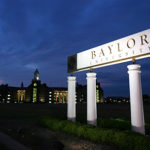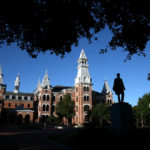WACO—At their fall meeting, Baylor University’s board of regents considered COVID-19’s impact on students’ health and safety, on the university’s budget and on plans for next semester.

During a Nov. 6 teleconference for news media, President Linda Livingstone noted the meeting provided regents a taste of what students have experienced this semester. During the hybrid meeting, some regents participated via Zoom teleconference, and others attended it inside one of the large portable tent-like structures erected on the Baylor campus.
Regents who participated in the in-person meeting had to undergo rapid COVID-19 testing at the university’s respiratory clinic. In-person participants also followed university health protocols that require wearing face masks and social distancing.
Baylor experienced an initial spike in COVID-19 cases in early September, but the number of new cases dropped by October and has remained stable, Livingstone reported.
“We were able to respond quickly to reverse that early fall trend by providing a comprehensive educational, testing, contact tracing and treatment program on behalf of student health and well-being,” she said.
Baylor’s online public COVID-19 dashboard shows a cumulative total of 1,254 cases since Aug. 1, but only 52 in the past seven days, with a 2.8 percent positivity rate.

“Our numbers continue to look good. Our positivity rate is low, but we can’t be complacent,” Livingstone said, pointing to a recent spike—locally and nationally—in cases of COVID-19.
“So, we have to continue to be diligent as we move through the next two and a half weeks or so of the semester leading up to Thanksgiving.”
Prior to the launch of the semester and in anticipation of a “second wave” of the virus in the fall, Baylor adjusted its schedule so students would not return to campus for classes after Thanksgiving.
Sign up for our weekly edition and get all our headlines in your inbox on Thursdays
In mid-April, Baylor announced a series of measures to cut costs by up to $80 million in response to the COVID-19 pandemic. Even so, expenditures related to COVID-19 continue to run higher than originally budgeted—particularly related to testing, campus infrastructure modifications and technology, Livingstone noted.
She acknowledged Baylor continues “to experience significant uncertainty” as it looks ahead to the spring semester.
“We don’t really know what the spring semester is going to look like, but we know that we have worked very hard this fall,” she said. “We’ve learned a lot, and we’ll be prepared to bring our students back in January.”
In an October teleconference, regents approved a 2 percent increase in tuition for the 2021-22 academic year, with no increase in room and board, lab fees, summer school rates or Baylor Law School tuition. The university reported the tuition increase is the lowest in two decades.
In other business:
- Livingstone reported the university administration received the recent Baylor Student Senate resolution asking for a reinterpretation of Baylor’s statement on human sexuality and policy change that would allow an LGBTQ group to become an officially chartered student organization. The matter was not on the board’s agenda, but regents “continue to have discussions as a board about how we are creating a caring community” for all students, she said.
- Board Chair Mark Rountree reported the 26-member commission on historic campus representation—created to examine Baylor’s historic links to slavery—expects to deliver its findings to Livingstone in December. “Their work has been marked by a real sense of humility, mutual respect and, at the end of the day, a desire to bring forth for the board’s consideration recommended actions that would unite and strengthen the entire Baylor family.” After board consideration in early 2021, Baylor plans to release the findings and recommendation in the spring.
- On a related subject, Livingstone reported continued progress in fostering an environment where racial equality is linked to Baylor’s mission and students of color feel valued and loved. Baylor’s first mandatory diversity education program for all students, faculty and staff will be released this week and completed by the end of the semester.
- Regents approved a Ph.D. in anthropology with a specialization in the anthropology of health.














We seek to connect God’s story and God’s people around the world. To learn more about God’s story, click here.
Send comments and feedback to Eric Black, our editor. For comments to be published, please specify “letter to the editor.” Maximum length for publication is 300 words.